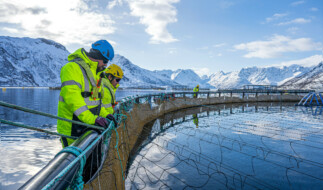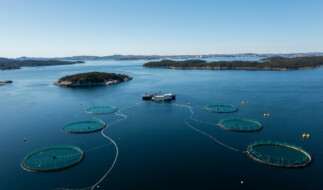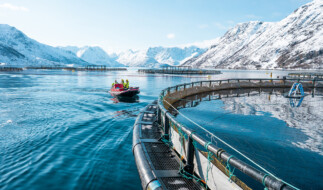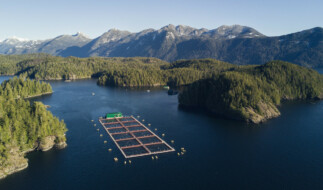Thai Ginger Salmon, served with Vegetable Stir Fry and Noodle Salad with Peanut Sauce
Serves: 4
Active Time: 25 minutes
Total Time: 50 minutes
This is a multi-part meal and we recommend trying all meal components together! See detailed recipes below.
Click here to download the full nutrition and environmental analysis
Thai Ginger Salmon
This savory ginger garlic sauce gives responsibly-raised salmon a delicious Thai-inspired twist. Serve the salmon with the accompanying Thai Vegetable Stir Fry recipe. The flavors – and heart-healthy seafood and vegetables – complement each other perfectly, and both make use of the same ginger garlic sauce. An Oldways recipe and photo, created in partnership with the Global Salmon Initiative.
Active time: 5 minutes
Cooking time: 20 minutes
Total time: 25 minutes
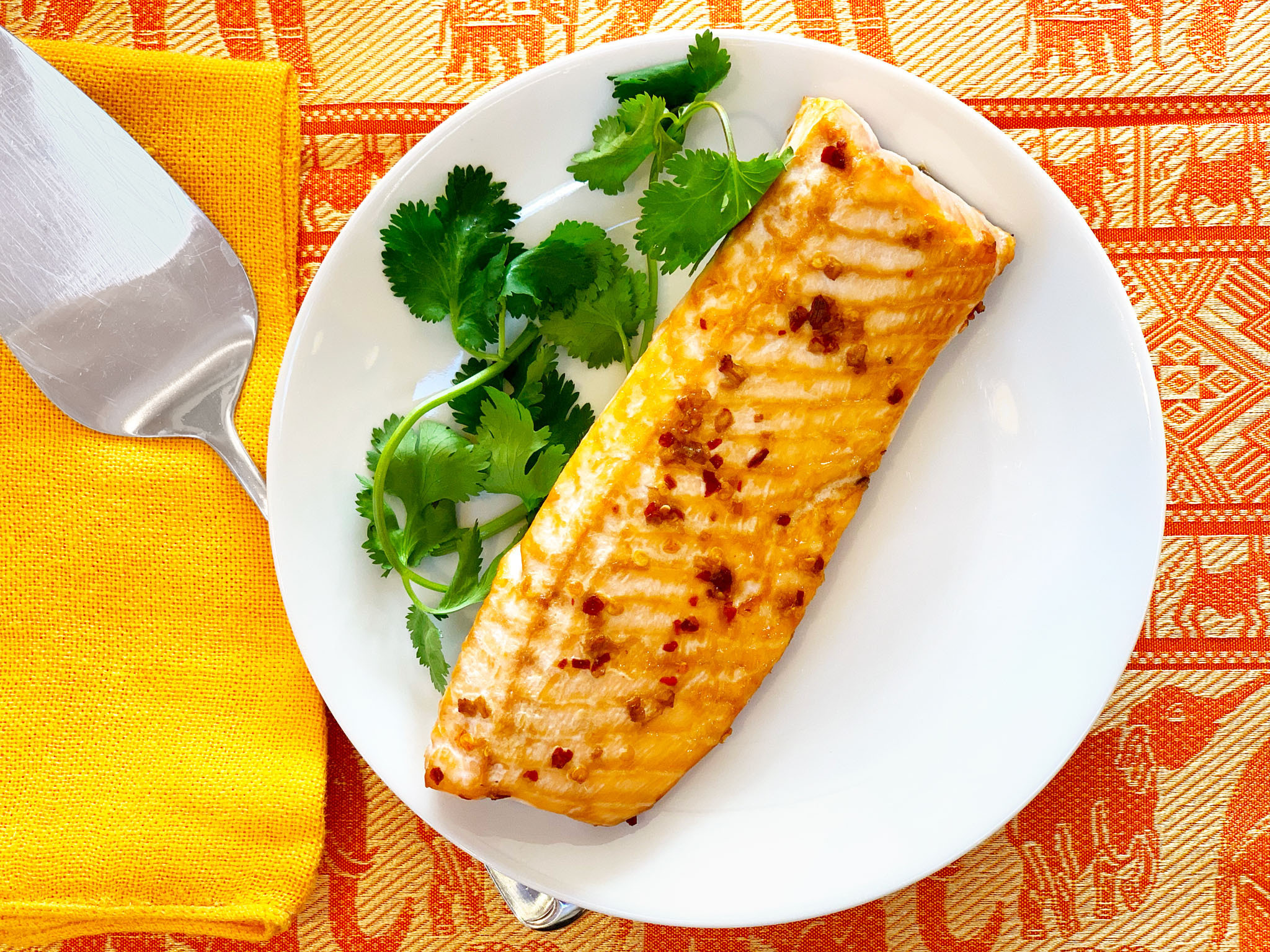
Ingredients
- 1 pound farmed salmon
- ¼ cup low sodium soy sauce
- 3 cloves garlic, minced
- 1 tbsp ginger, minced
- Juice of 1 lime
- 1 tsp red pepper flakes
Instructions
- Preheat oven to 400°F. Place the salmon in a baking dish, skin side down.
- Mix the soy sauce, garlic, ginger, lime juice and red pepper flakes in a measuring cup. Pour half (about ¼ cup) of this soy sauce-ginger-lime mixture over the salmon in the baking dish, making sure all the salmon is sauced. Reserve the other half for the accompanying Thai Vegetable Stir Fry.
- Bake for approximately 20 minutes, until salmon flakes easily with a fork.
Sustainability Tip
N/A
Environmental Footprint
Four servings of this recipe amounts to:
2,884.54 gCO2e
1,093.57 liters water
This Planetary Plate’s total environmental footprint is 4,281.35 gCO2e and 1,984.96 liters water (four servings). For comparison, spaghetti & meatballs with a salad amounts to 21,680.46 gCO2e and 8,561.87 liters of water (four servings).
Thai Vegetable Stir Fry
This vegetable-packed stir fry pairs beautifully with the Thai Ginger Salmon, as both recipes make use of the same delicious sauce. Stir fries are a great way to get your veggies in for the day and are quite adaptable, so feel free to substitute any fresh vegetables that you have on hand or that are in season near you. An Oldways recipe and photo, created in partnership with the Global Salmon Initiative.
Active time: 10 minutes
Cooking time: 0 minutes
Total time: 10 minutes
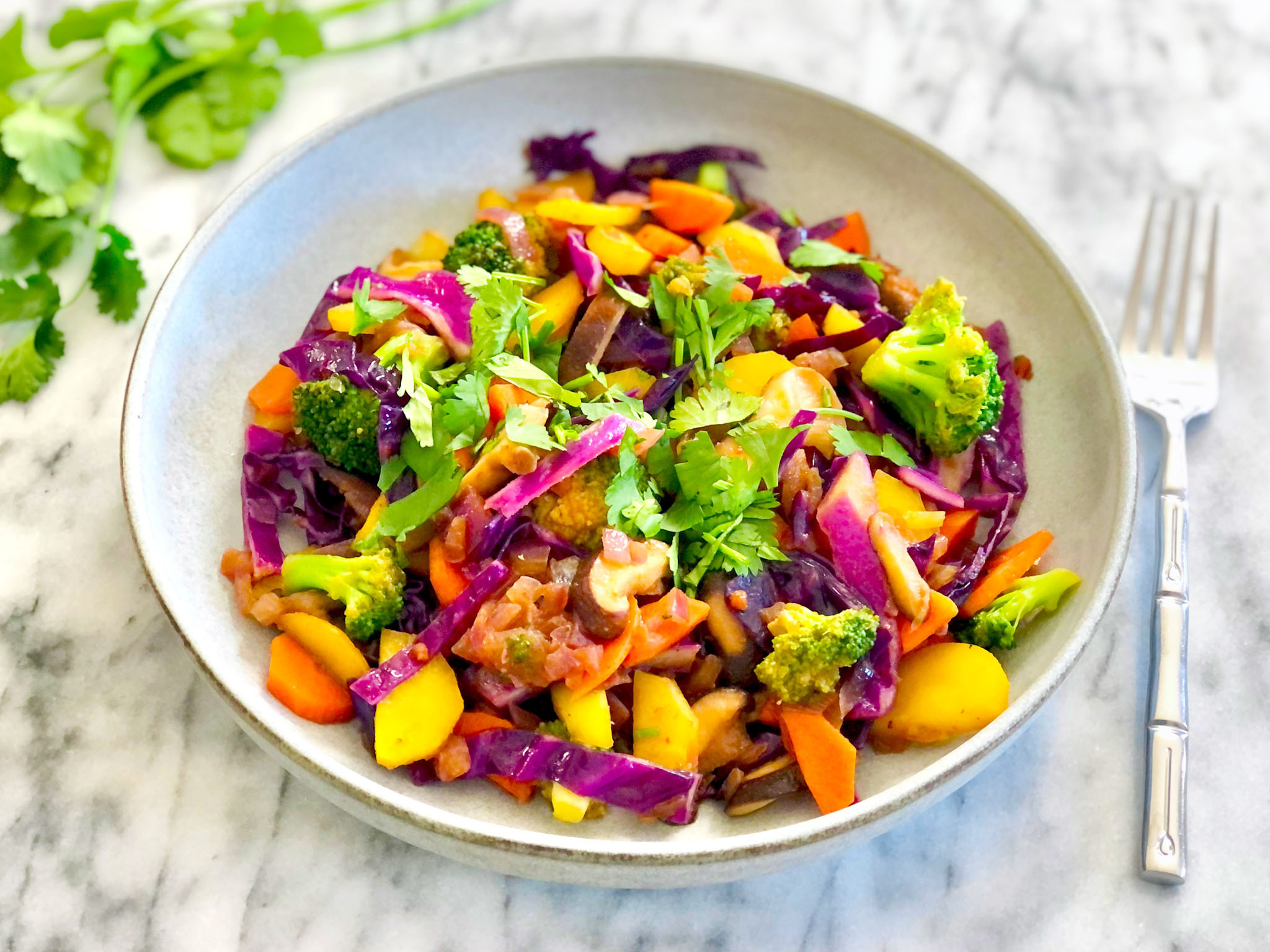
Ingredients
- 1 tbsp peanut or olive oil
- 1 medium red onion, chopped (about ½ cup)
- ½ tbsp ginger, minced
- ¼ tsp chopped red chili pepper
- 2 carrots, sliced into half-coins (about 1 cup)
- 3 oz mushrooms, sliced (about 1 cup)
- ¼ cup soy sauce-ginger-lime mixture (reserved from the Thai Ginger Salmon recipe)
- 1 cup broccoli florets
- 1 cup red cabbage, sliced into thin ribbons (yield from about 1/8 head of cabbage)
- ¼ cup chopped fresh cilantro
- Optional seasoning: Sriracha sauce, lime juice, soy sauce
Instructions
- Heat a wok or large skillet over medium-high heat and add 1 tablespoon of peanut or olive oil.
- When the oil is hot, add the red onion and ginger. Cook for 1-2 minutes.
- Add the red chili pepper, carrots and mushrooms, plus a heaping tablespoon (about 1/3 of the total) of the remaining soy sauce-ginger-lime mixture and cook for another 2 minutes.
- Add the broccoli and red cabbage, plus the rest of the soy sauce-ginger-lime mixture. Reduce the heat and cook the vegetables until they are cooked and still crisp, about 5 minutes.
- Garnish with cilantro. Taste and adjust seasoning, adding additional lime juice, soy sauce or sriracha if desired.
Sustainability Tip
Be sure to look for some of the ingredients (carrots, red onion, cabbage, etc.) at your local farmers’ market. Feel free to substitute any fresh vegetables that you have on hand or that are in season near you.
Environmental Footprint
Four servings of this recipe amounts to:
458.78 gCO2e
244.43 liters water
This Planetary Plate’s total environmental footprint is 4,281.35 gCO2e and 1,984.96 liters water (four servings). For comparison, spaghetti & meatballs with a salad amounts to 21,680.46 gCO2e and 8,561.87 liters of water (four servings).
Thai Noodle Salad with Peanut Sauce
This Thai Noodle Salad tastes delicious warm, room temperature or chilled. We recommend serving with a protein, such as Thai Ginger Salmon. A countertop herb garden is a great way to have fresh herbs (like cilantro) on hand at all times, so that you only need to harvest what you’re using without letting any go to waste. An Oldways recipe and photo, created in partnership with the Global Salmon Initiative.
Active time: 10 minutes
Cooking time: 5 minutes
Total time: 15 minutes
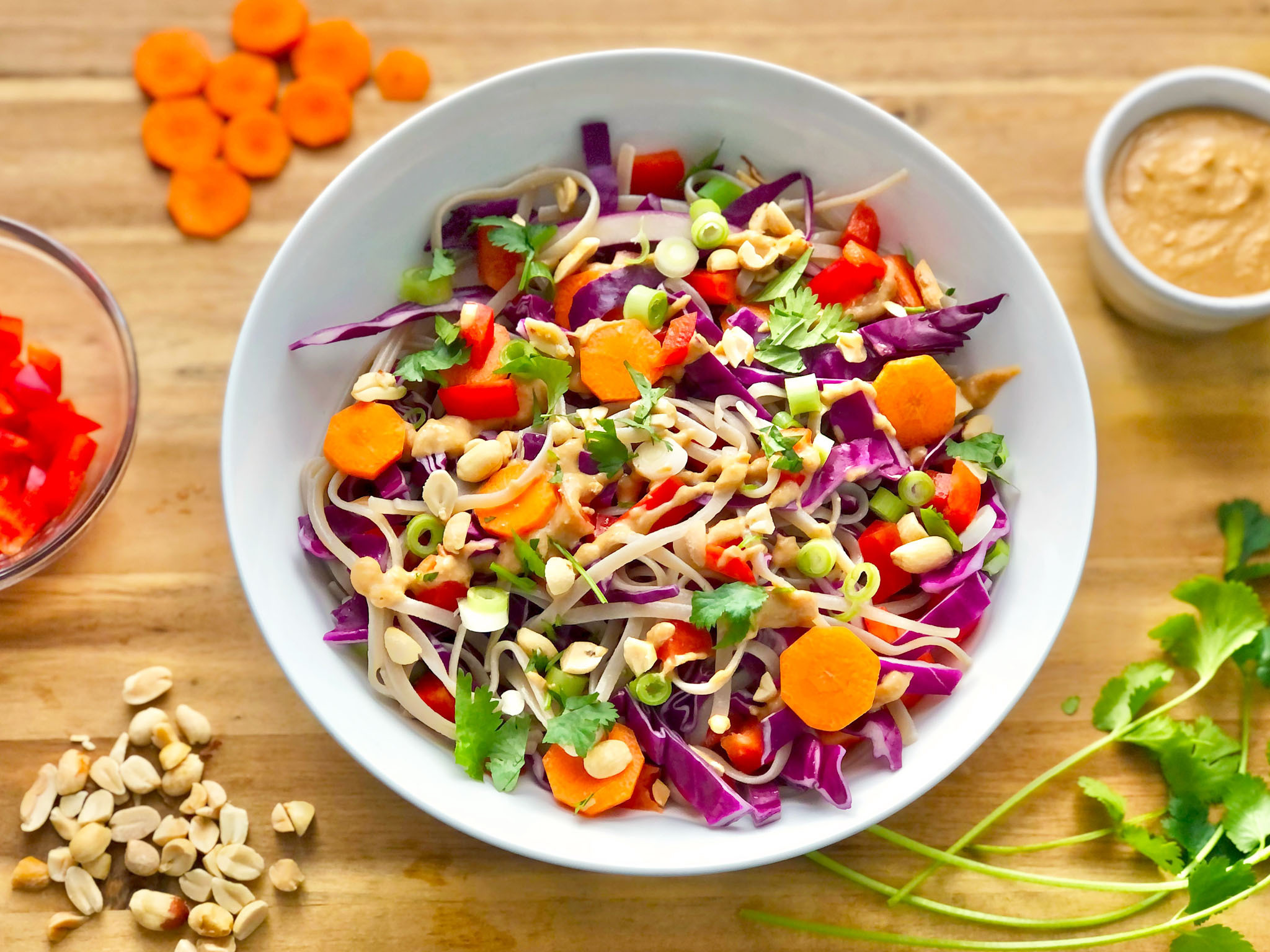
Ingredients
For the Peanut Sauce
- Juice of 1 lime (about 2 tablespoons)
- 2 tsp rice wine vinegar
- 2 tbsp water
- 2 tsp low sodium soy sauce
- ¼ cup natural peanut butter
- 1 tbsp brown sugar
- ½ tsp ginger, finely minced
- 1 small garlic clove, finely minced
For the Thai Noodle Salad
- 4 oz brown rice Pad Thai noodles
- 2 cups red cabbage, sliced into thin ribbons (yield from about ¼ head cabbage)
- 1 large carrot, sliced into coins
- 1 red bell pepper, chopped
- ¼ cup cilantro leaves, chopped
- 2-3 scallions, chopped (about ¼ cup)
- ¼ cup roasted peanuts, chopped
- Optional topping: chopped peanuts and cilantro
Instructions
- To make the Peanut Sauce, mix the lime juice, vinegar, water and soy sauce with the peanut butter. Add the brown sugar and stir well. Add the ginger and garlic, and stir to combine. Set aside while you prepare the salad.
- Cook the brown rice Pad Thai noodles according to the package directions (approximately 4-5 minutes in boiling water). Drain and rinse. The noodles may stick together. If they do, rinse again.
- Mix the noodles with red cabbage, carrots, bell pepper, cilantro, scallions and peanuts. Dress the salad with the Peanut Sauce. Garnish with chopped peanuts and cilantro, if desired.
Sustainability Tip
Double the Thai salad sauce and freeze it for quick and easy use for next time
Environmental Footprint
Four servings of this recipe amounts to:
938.03 gCO2e
646.97 liters water
This Planetary Plate’s total environmental footprint is 4,281.35 gCO2e and 1,984.96 liters water (four servings). For comparison, spaghetti & meatballs with a salad amounts to 21,680.46 gCO2e and 8,561.87 liters of water (four servings).
